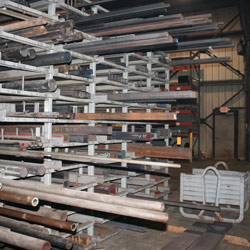
How important is manufacturing to Illinois?
The foundation on which our state is built, manufacturing is the single largest contributing sector to our economy at roughly 13 percent of state gross domestic product. Illinois is the nation’s fourth largest industrial state, with value-added manufacturing reaching $94.1 billion. Consider these facts:
- Illinois is home to nearly 19,000 manufacturing facilities.
- More than 600,000 Illinois residents are employed in manufacturing—our state’s greatest producer of middle class jobs.
- Manufacturing jobs pay higher wages than the service sector—more than 20 percent higher on average—generating increased buying power, boosting consumer confidence and stimulating the economy.
- The bulk of Illinois merchandise exports—93 percent—are manufactured goods.
- 35 Illinois-based manufacturers were included in IndustryWeek’s list of the Top 500 U.S. Manufacturers in 2007.
How has the economic downturn affected Illinois manufacturers?
Illinois manufacturers have been hit hard by the global recession. Beginning in the fall of 2008, large companies moved quickly to cut production, reduce costs and shelve expansion plans. Ripples up the supply chain were immediate, leaving many suppliers with canceled orders on the shipping dock. Often within days, small and midsized companies were forced to revise their business plans. Across-the-board cutbacks—including layoffs—came quickly.
Today, the state’s unemployment numbers are above the national average and rising. According to a recent economic review by the Regional Economics Applications Laboratory at the University of Illinois, our state is poised to lose another 120,800 manufacturing jobs in the next year alone. This decline in manufacturing employment can be reversed, however, if Illinois manufacturers start now to prepare to be highly competitive as the economy recovers.
What other challenges do Illinois manufacturers face?
Fierce international competition, changing workforce demographics and complex global supplier networks are a few of the challenges facing Illinois manufacturers—forcing companies large and small to reassess their markets, products, services and business strategies. What’s considered world-class today will be standard practice in a few years. To compete and win, Illinois manufacturers must adapt to the fast-changing realities of the global marketplace. Success is achievable but requires a renewed focus and commitment by our government leaders to provide manufacturers with adequate resources.
Are Illinois manufacturers prepared to succeed in the future?
Results from the recent Illinois Next Generation Manufacturing Study confirm that some top-performing firms are preparing now to succeed in the next generation—but many others remain challenged to implement strategies that will enable them to compete and sustain their companies for the long term. It’s clear from the study that companies large and small understand the need to re-assess their markets, differentiate their products and services, and focus on the value they can provide to customers both domestically and abroad.
The study found that many manufacturers are making limited progress across key performance metrics and that smaller firms in particular are more likely to face difficulties. Of potential concern are manufacturers who aren’t engaged in change or transformation, as well as firms that recognize the importance of adopting next generation strategies but are unable or unwilling to act. Another concern from the study is the fact that Illinois manufacturers may be ill-prepared to participate in emerging market sectors such as alternative energy.
What support is available to Illinois manufacturers to help them succeed?
Since 1996, the Illinois Manufacturing Extension Center, or IMEC, has helped small and midsized Illinois manufacturers meet the challenges associated with globalization, quality, cost and delivery performance. IMEC’s team of 27 manufacturing specialists assists more than 400 manufacturers each year in the areas of operating cost reduction, quality improvement, continuous improvement technology and innovation, and growth strategies. A non-profit corporation, IMEC is part of the National Institute of Standards and Technology’s Manufacturing Extension Partnership. IMEC has 10 office locations throughout Illinois and is headquartered at Bradley University in Peoria.
What value does IMEC provide to Illinois manufacturers?
In 2008, IMEC assisted more than 400 Illinois manufacturers, helping them contain costs, improve efficiency and get to market faster with new and improved products. These manufacturers report that the $1.3 million they invested in IMEC’s assistance is expected to result in more than $411 million in new and retained sales and nearly $21 million in cost savings and other benefits. The average client also reports $72,000 in cost savings, $150,000 in capital investments and $2.3 million in sales improvements per project. Perhaps most important, IMEC clients in 2008 were able to create or retain 1,750 Illinois jobs.
According to independent research, manufacturers assisted by IMEC achieve sales and cost benefits four times greater than firms that don’t receive similar help—and typically hire workers and invest in facilities when many others are struggling. These investments generate more than seven dollars in benefits for every dollar a company invests in IMEC's services.
What value does IMEC provide to the State of Illinois?
Manufacturers that receive IMEC’s assistance typically invest in advanced technology, machinery, equipment and facilities. Independent studies verify that these investments, along with increased sales and profits, return four dollars to the state’s tax rolls for every dollar the state invests in IMEC.
How is IMEC funded? What additional support is needed?
Support from the state and federal government enables IMEC to develop a highly trained staff, reach out to small and midsized companies and establish capabilities that help them succeed. IMEC leverages every dollar of state support with at least two additional dollars from industrial and federal sources. Companies pay a significant part of the cost of IMEC services, helping ensure their commitment to innovation and improvement.
Illinois legislators have provided funding for IMEC since 1996—but last year, the former governor vetoed the appropriation. IMEC is requesting a base funding amount of $2 million in Illinois’ 2010 budget. This level of funding will allow our state to leverage additional federal matching funds made available by the Obama administration to assist manufacturers—and ensure IMEC can continue to provide necessary services when our state’s manufacturers most need them. iBi
Source: Illinois Manufacturing Extension Center at Bradley University, imec.org.

